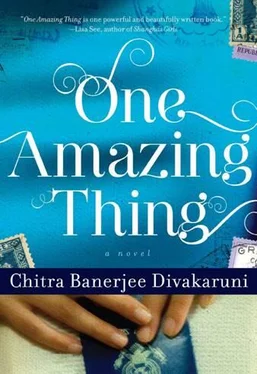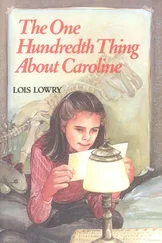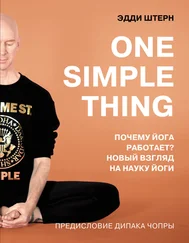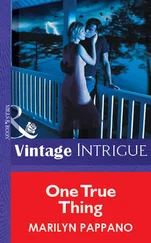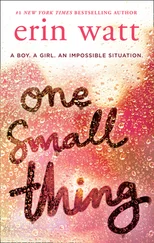The boys chase a soccer ball around the yard. From the articles he’s been reading to prepare for this journey, Cameron knows they call soccer something different here. But holes have opened up in his memory, and he can’t remember what. The girls play crocodile, jumping onto the porch of the old building with shrieks of delight and terror so that the girl who is crocodile can’t get them. Their legs are thin and scabbed, but when they run they’re transformed into forest flashes of golden brown. Seva runs the fastest; the crocodile will never catch her. When she reaches the gate, she swings up on it. Seva, Cameron calls. Seva! She looks out through the bars, an inquiring frown on her face, as though she can hear but can’t see him. Behind her the mountain range is wrinkled and friendly, like the head of an elephant. The air smells of cow-dung fires. A goat bleats to be milked.
He drops the backpack and runs to the gate. He wants to touch her determined fingers, the nails black with dirt. But the orphanage bell is ringing. It summons the children to study hour. They make a ragged, reluctant line at the pump so they can wash their hands and feet. A teacher in a faded sari appears on the porch and yells at Seva to get off the gate, but she hangs there for an additional moment, listening, a perplexed expression in her eyes.
Seva, he shouts, it’s Cameron . He’s only a foot away from her now. He can see the gap between her top teeth, which are a little crooked. One of her braids has come undone. Flecks of rust from the gate coat her forearms. She has a muddy smudge on her cheekbone. He reaches through the bars to wipe it off.
Seva! the teacher thunders.
Coming, Mam, she says. She jumps down from the gate, agile as a monkey, leaving Cameron’s finger to caress the air.
“THAT SUCKS, MR. M,” LILY SAID. “TO FINALLY FIND SOMEONE you love so much and then lose her like that. No wonder you were pissed off. I’m glad you got away.”
Now that he had finished his story, Mangalam’s teeth began to chatter again. He hugged himself. “I got away geographically,” he said. “But not legally. Or psychologically. Naina’s still my wife, and I can’t forget that. Maybe today, in a while, I really will become free.” He glanced up where the collapsed ceiling had been, and Uma, following his eyes, caught a movement there. A shattered light fixture, still attached by its chain to something, had begun a small, swinging movement. Why would it do that?
“It wasn’t all Naina’s fault,” Mangalam continued. “I started the cycle of wrongdoing. I used her to get what I wanted. It’s only fair that she became the cause for losing what I wanted even more. Karma’s wheel is intricate.”
“What do you mean, karma’s wheel?” said Mrs. Pritchett. She leaned across her husband toward Mr. Mangalam.
“Remember how I flirted and enticed purposely, intending to snare Naina’s friends? Well, after I achieved my purpose and was sent away to America, I found I couldn’t stop behaving like that toward women-even those I respected and felt a genuine liking for.” Here he glanced at Malathi. “It was like those stories we tell children to frighten them into goodness: if they grimace long enough, their muscles will freeze, and when they want to smile, they will not be able to.”
Mangalam turned toward Malathi and spoke as though they were alone. “I think we might die here-perhaps in the next few hours, if more of the building comes down or the air deteriorates further… I don’t want to die without telling you that I’m sorry for my behavior.”
Malathi said, “I accept. And thank you for translating my story, which I chose partly to jab at you, the kind of man I thought you were.”
Cameron had been coughing intermittently, but now he had a prolonged fit that left him gasping. Uma tried to hold him upright and Lily hurried over to help. He had to push their arms away to get at his pocket and extract the inhaler, which he used. When he held his breath, Uma found that she, too, was holding hers. He handed the inhaler to her-so frighteningly light-and she put it back in his pocket. Another puff and he might as well throw it away. “Tell your story,” she said to Cameron.
“I can’t,” he whispered, rubbing his chest. “It isn’t ready.”
She knew what he meant. Hers wasn’t ready either.
Then Mrs. Pritchett cleared her throat.
Iapologize in advance for my story. I know it will cause my husband pain. The way I see these events is not how he views them; it cannot be. I only hope that he-and all of you-will see by the end why I had to tell this story.
You’ve been speaking of events that shatter lives in a day’s time: wars, betrayal, seduction, death. In my case, my life was turned around by a man I didn’t know helping his wife take off her coat.
THAT FATEFUL DAY BEGINS WITH MRS. PRITCHETT ENJOYING A cup of lemon tea in her morning kitchen, closing her eyes and breathing in the tangy steam. She believes in life’s small pleasures. Around her, the kitchen gleams: immaculate granite counters, a purring Sub-Zero refrigerator, a blue ceramic bowl she made in pottery class. The bowl is filled with apples and pears, her husband’s favorite fruits.
Mrs. Pritchett has sent her husband off to his office on a wholesome breakfast of oatmeal with almonds and brown sugar and a glass of freshly squeezed orange juice. Until he returns in the evening, the day lies ahead of her, luxurious as a stretching cat waiting for her to stroke it. She makes a mental list: go into her dewy garden and pick an armful of irises; tidy the house in preparation for dinner guests, Mr. Pritchett’s old clients, grown into friends over the years; visit the local market to pick up strawberries for an English trifle she’s planning to create. After shopping, she may stop for lunch at the little deli nearby. Their sandwiches are excellent, made with bread they bake each morning in the back. At teatime she’ll meet her monthly book club, intelligent, pleasant women, several of them in their late sixties like her; she is ready for the meeting, with a page of notes on The House of the Spirits. When she gets home, she’ll put on a Satie CD and lie down on the couch. (This need for rest would have irked her when she was younger; she accepts it with equanimity now.) Then it’ll be time to prepare dinner-an easy task. The lamb has already been marinated, the greens washed and patted dry.
It does not strike Mrs. Pritchett that her life is small and contained, filled with bourgeois pleasures. If it did, she would not consider that a bad thing.
SHE IS RUNNING LATE, AND THE LITTLE CAFÉ IS EMPTY WHEN she gets to it, the lunchtime crowd gone. This disappoints her for a moment; she loves to people watch. But no matter. She orders ham and melted cheese on rye and bites into the crusty bread with vigorous pleasure. Then she sees the couple walking in. They’re old; the husband has age spots on his face and trembly hands with which he guides his wife. She has aged worse than he. She wears thick, Cokebottle glasses and shuffles with painful slowness, leaning on a cane, one of those ugly aluminum quadruped things. Mrs. Pritchett watches them with a mix of pity and fear. One day soon, she and her husband will come to this.
The couple has reached a table. The old man lets go of his wife’s arm and pulls a chair out for her. He helps her off with her coat, an action that takes some maneuvering as she shifts her cane from one hand to the other. But he is patient, and when it’s off, he hangs it carefully on the back of her chair. He flicks a speck off the sleeve before he turns back to his wife and helps her sit down. The couple discusses the menu, the woman pointing with sudden animation to items while the man inclines his head toward her to hear better. Then he nods gravely and summons the waitress. Mrs. Pritchett dawdles over her sandwich; she is curious about their order, which turns out to be a sugar-dusted lemon square and a decadent, oversize éclair. The man cuts each in half so they can share them. It’s the flicking of the speck off the sleeve that gets Mrs. Pritchett-the caring behind the gesture, even though his wife with her poor vision would never have noticed whatever was on the coat sleeve.
Читать дальше
